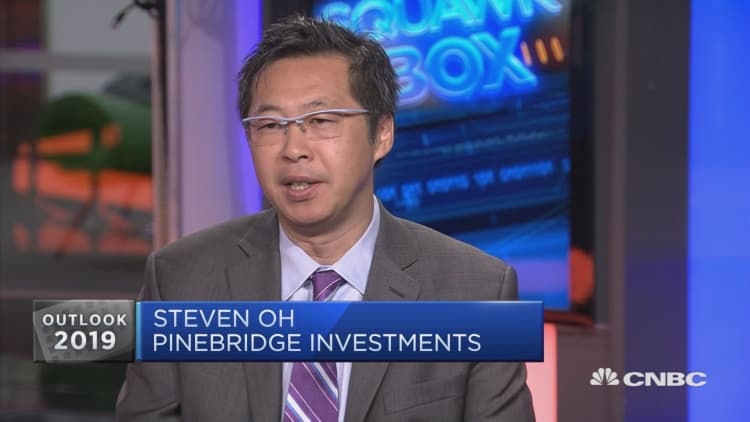
2019 will see lower returns and greater volatility for fixed income investors, Steve Oh, the global head of credit and fixed income at PineBridge Investments, told CNBC Monday.
Oh told CNBC's "Squawk Box Europe" that investors should review their portfolios amid concern over higher rates globally and potential tightening from both the European Central Bank (ECB) and the Bank of Japan (BOJ) sometime in 2019 or 2020.
"Rate normalization in the U.S. has been the major theme across fixed income markets in 2018 ... Higher rates now may be ahead globally, as both the ECB and the BOJ appear poised to begin tightening sometime in 2019 or 2020, albeit at a very slow pace," he said in an accompanying research note earlier this month.
He added that volatility could also be caused by a rapidly expanding U.S. budget deficit which is predicted to materially exceed $1 trillion annually by 2020.
"The U.S. will need to increase debt issuance substantially, even as Treasury yields become less competitive and foreign demand shifts back to local markets," Oh added. A bond's yield has an inverse relationship to its price.
"The potential imbalance in supply-demand conditions could place upward pressure on yields in an environment of weakening economic conditions that is typically beneficial for bond investors."
Peak year for US?
Oh believes that while markets will remain largely favorable in 2019, investors should be more cautious as "the U.S. is likely to end its tightening cycle towards the end of 2019." The U.S. Federal Reserve has hiked rates several times this year, tightening financial conditions in the country, and is expected to continue on this path during 2019.
"2018 was always going to represent a peak year for U.S. economic growth and the growth divergence between the U.S. and the rest of the world. At the beginning of this year, the market consensus expectation was that the dollar would weaken and that certainly didn't play out partly because of stronger growth. But that reverses starting in 2019 and particularly in 2020 going forward."
Oh said this reversal would not see the U.S. "heading to a recession-type scenario" but "the gap narrowing overall and policy rates and differentials narrowing in the future."
'Taking back from the future'
Interest rate hikes and an economic downturn in 2019 could put pressure on President Donald Trump ahead of his 2020 election campaign. According to the Wall Street Journal, Trump is reportedly unhappy with Treasury Secretary Steven Mnuchin's, blaming him for the appointment of Federal Reserve Chairman Jerome Powell who continues to raise interest rates. Trump denied WSJ's report as "fake news" on Twitter.
"We don't see any changes from the political aspect overall with the appointments of either Mnuchin or Powell. Next year was always designed to be an inflection year in U.S. Fed monetary policy,"
"When you artificially boost growth through fiscal stimulus then you're taking back from the future and have to pay for that at some point," he added.

